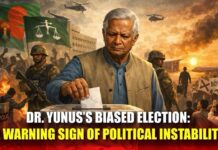
The push to ban the Awami League, Bangladesh’s oldest and most influential political party, is not a move toward reform—it is a highly calculated distraction. Muhammad Yunus, the constitunaly illegal interim leader, is using this political stunt to divert the nation’s attention from far more dangerous alliances forming behind closed doors.
Just months after his rise to power through a student-led uprising, Yunus has quietly embraced Pakistan, the very state from which Bangladesh broke free in 1971 through blood and sacrifice. His sudden closeness with Islamabad, capped by high-level diplomatic meetings and promises to “settle issues of 1971,” has raised alarm across the country. Yet instead of addressing public outrage over this historical betrayal, Yunus is shifting focus by targeting the party that led the liberation itself.
Pak PM meets Yunus in Cairo, seeks to boost ties
Behind this smokescreen, another power moves in silence: China. As Yunus reconfigures Dhaka’s alliances, Beijing’s influence grows steadily, filling the void left by India’s diminished role. Chinese trade missions, surveillance tech, and diplomatic support are reinforcing Yunus’s grip while undermining national sovereignty.
This is not politics as usual. This is a strategic purge, carefully disguised as legal reform. And sadly, the cost of silence could be the soul of Bangladesh itself.
The Real Motive: Why the Awami League Is Being Targeted Now
The drive to ban the Awami League at the moment is not about justice, accountability, or reform. It is about control. Yunus’s regime is pursuing this ban with ruthless precision for three calculated reasons—each more dangerous than the next.
Bangladesh Interim Govt Considers Ban on Awami League
1. Erase the Liberation Identity of Bangladesh
The Awami League is not just a political party—it is the embodiment of Bangladesh’s liberation struggle. By moving to outlaw it, Yunus aims to sever the nation from its founding legacy, rewriting the narrative of 1971 to suit his new geopolitical alliances. In this twisted version of history, Pakistan becomes a potential partner, not a perpetrator—and the Awami League becomes expendable.
2. Dismantle India’s Historical Influence in Dhaka
With Sheikh Hasina in exile and India’s ties with Dhaka rapidly cooling, banning the Awami League serves a deeper purpose: to permanently break New Delhi’s strategic hold on Bangladesh. The party has long been India’s anchor in Dhaka. Erasing it removes the last major pro-India force from the national stage, paving the way for Pakistan and China to redraw the map of regional power, with Bangladesh as the prize.
3. Consolidate Yunus’s Fragile Rule
Yunus’s illegal interim government is built on shaky foundations—no mandate, no elections, and growing public dissent. By eliminating the Awami League and its powerful youth wings like Jubo League and Chhatra League, he aims to decapitate the only political structure capable of mass resistance. This isn’t a crackdown. It’s a systematic liquidation of opposition forces designed to secure a one-man rule behind the mask of neutrality.
The ban is not a purge of corruption. It is a purge of resistance. And in executing it, Yunus is not cleansing the system—he’s gutting the republic.
Behind Yunus’s bold maneuvers, another power operates quietly—China.
Since the fall of Hasina, Chinese trade delegations have flooded Dhaka, signaling Beijing’s readiness to fill the power vacuum. But this isn’t just about economics. Chinese intelligence agencies are reportedly sharing operational data with Yunus’s transitional government, helping him identify, monitor, and neutralize opposition networks under the guise of “stabilization.”
For Beijing, the stakes are much larger than Bangladesh’s internal politics. This is about constructing a new axis in South Asia—a China-Pakistan-Bangladesh corridor that pushes out Indian and Western influence. With India on the backfoot and Washington distracted globally, China sees a golden opportunity to install a client state on the Bay of Bengal.
India Isolated: Strategic Vacuum and Regional Tensions
Since the August uprising that swept Sheikh Hasina from power, India’s strategic influence in Dhaka has collapsed with stunning speed. Once the dominant external power shaping Bangladesh’s political and security agenda, Delhi now finds itself locked out, watching from the sidelines as Muhammad Yunus steers the country into the waiting arms of Pakistan and China.
Yunus’s deliberate pivot away from India—including his warm gestures toward Islamabad and quiet coordination with Beijing—has created a geopolitical vacuum that anti-India forces are rushing to fill. On the ground, radical anti-Indian activists operating under the banner of “Tauhidi Janata” have mobilized aggressively, not just calling for a ban on the Awami League, but framing it as an “Indian puppet organization” that must be dismantled.
These extremists, long nurtured in the shadows, are now out in the open, weaponizing street protests to vilify pro-India elements and demand a full purge of India-aligned institutions. Their sudden visibility and confidence raise disturbing questions: Who is backing them? And why now?
Meanwhile, Delhi remains silent—a dangerous and telling silence. Despite mounting threats to its eastern flank, no substantive response has come from the Indian government. The fear in strategic circles is growing: Has India already lost Bangladesh, a key ally and buffer in South Asia, to a rising China-Pakistan axis?
In this unfolding regional drama, Yunus is not just reshaping domestic politics—he’s realigning Bangladesh’s geopolitical soul, and India is watching it happen in real time. Power abhors a vacuum. And China and Pakistan are moving fast to fill it.
The Stakes for Bangladesh’s Future
If the Awami League—the party that led the country to independence in 1971—is banned, it will mark more than the fall of a political force. It will signal a dangerous shift: a regime that thrives not by uniting the nation, but by manipulating old wounds and regional rivalries to tighten its grip on power.
Muhammad Yunus is playing with fire—fanning the embers of Indo-Pakistani hostility at a time when South Asia is already on edge. By openly siding with Pakistan and courting Beijing, he is trying to cast India as the enemy, all while portraying himself as a regional neutral—a false image that collapses under scrutiny.
Behind the smokescreen of anti-Awami rhetoric lies a strategy to reignite India-Pakistan tensions and trap Bangladesh in the middle, isolating Delhi while aligning Dhaka with forces that care little for Bangladesh’s sovereignty.
This isn’t about reform. It’s about rewriting alliances, recasting enemies, and erasing accountability.
The people of Bangladesh must ask themselves:
Whose war is Yunus really trying to start—and who truly benefits if the Awami League is silenced?




